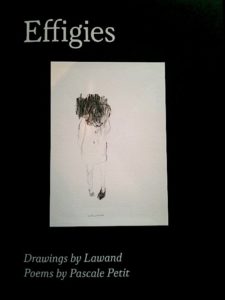Effigies
REVIEWS, 1 Jan 2018
Sumeet Grover – TRANSCEND Media Service
Effigies, by Lawand and Pascale Petit (ISBN 978-9950-313-46-0)
 A collection of drawings by Syrian artist Lawand, accompanied by poems which were composed by the British poet Pascale Petit in response to these images.
A collection of drawings by Syrian artist Lawand, accompanied by poems which were composed by the British poet Pascale Petit in response to these images.
This book was commissioned by The Mosaic Rooms, an art foundation in London, which exhibits works from the Middle-East. Lawand’s drawings are heart-breaking: his pencil sets off a flame, and figures are born out of it. His sketches hit unformed emotions and unspoken experiences in the reader. As I write this review, I cannot help but notice how much I myself feel drawn towards writing poems in response to his drawings one day; but I will limit this review to Petit’s poems, which transport Lawand’s drawings into the verbal realm.
Although, even the verbal realm into which Petit’s poems take us has the language of some other world; such is the appeal of her words. Mature, motherly, wounded and child-like: these are some of the feelings which flow out of Petit’s pen as she observes the intensity in Lawand’s moving pencil. Her poems give these images a life and a story of their own. In Girl in Flight, a little girl flies up above the skies with godly powers,
“The girl up in the air / has given up on gravity… / She can reach the light of another world / if this one won’t help her.”
The pain, the wounds of a child in this poem are given expression and then liberated beyond the stars.
At times there is also a sense of confinement, an imprisonment of pain in the body as Petit writes in Crush Cage,
“In the feral hours / when the bars of my ribs tighten, / the walls of this room / become a crush cage.”
It is only the mature and experienced poet who can achieve a balance between darkness and light, between pain and wisdom. This is what Petit achieves in her poems as one turns the pages. In Veil, a boy’s body covered in a blackened shell hands out some meaning, as she writes
“and if I rough in a black veil / over the face / it’s so that you, viewer, / will not be blinded.”
Lawand’s images also invoke in Petit the theme of family and violence. In The Double, she writes
“Even as he slips the knife in / he tells me he is my brother.”
Lastly, her poems look at the tension between the self and society, between one’s own troubles and the responsibilities in family, as she writes in A Woman’s Face,
“This mother, at her dressing table, trying to decide / which face to wear, asking advice from shadows…”
We hold in our own shadow, aspects of ourselves which we cannot tolerate, and aspects of ourselves, which we are told by the society and family as being unacceptable. From one perspective, the poems in this book are a dialogue with the shadow, but from another, they are a quest in finding meaning. Both Lawand and Petit lay bare human suffering, in a gentle, manageable and respectful way. In poetry these themes are often the hardest to achieve, but this balance is what Lawand and Petit collectively create.
______________________________________________
 Sumeet Grover is the founder of Global Poetry, dedicated to creativity, human dignity, dialogue and global citizenship. He is a winner of the Portico Brotherton Open Poetry Prize 2014 and was shortlisted for the Jane Martin Poetry Prize in 2014 & 2015. He has authored two books of poetry: House Arrest & Disobedience (2015) and Change (2011). Grover is a member of the TRANSCEND Network for Peace Development Environment.
Sumeet Grover is the founder of Global Poetry, dedicated to creativity, human dignity, dialogue and global citizenship. He is a winner of the Portico Brotherton Open Poetry Prize 2014 and was shortlisted for the Jane Martin Poetry Prize in 2014 & 2015. He has authored two books of poetry: House Arrest & Disobedience (2015) and Change (2011). Grover is a member of the TRANSCEND Network for Peace Development Environment.
This article originally appeared on Transcend Media Service (TMS) on 1 Jan 2018.
Anticopyright: Editorials and articles originated on TMS may be freely reprinted, disseminated, translated and used as background material, provided an acknowledgement and link to the source, TMS: Effigies, is included. Thank you.
If you enjoyed this article, please donate to TMS to join the growing list of TMS Supporters.

This work is licensed under a CC BY-NC 4.0 License.